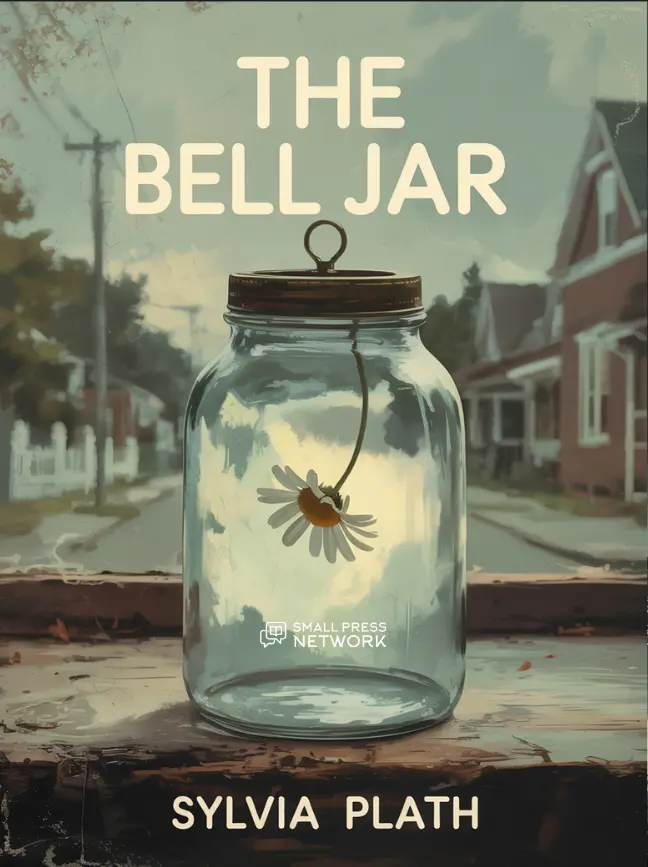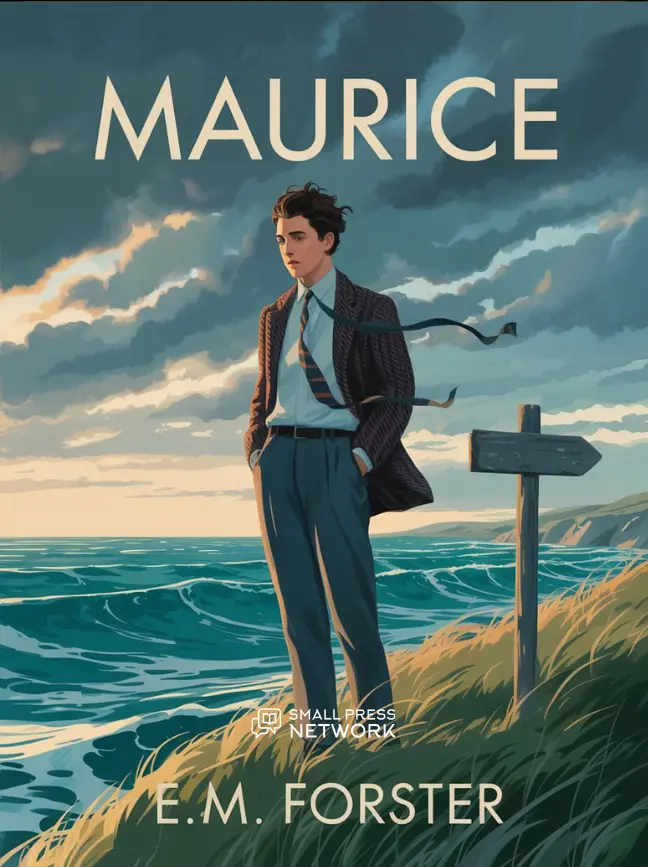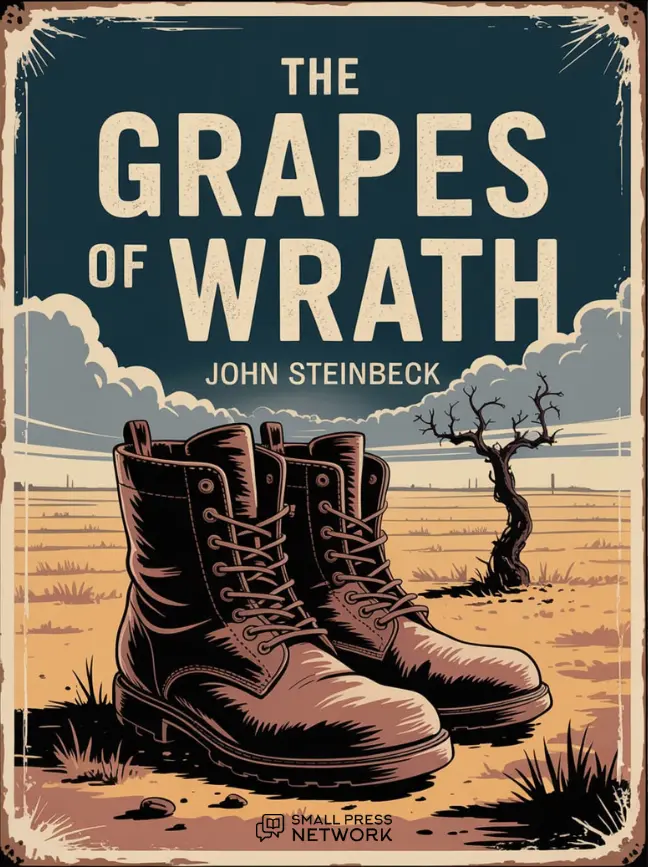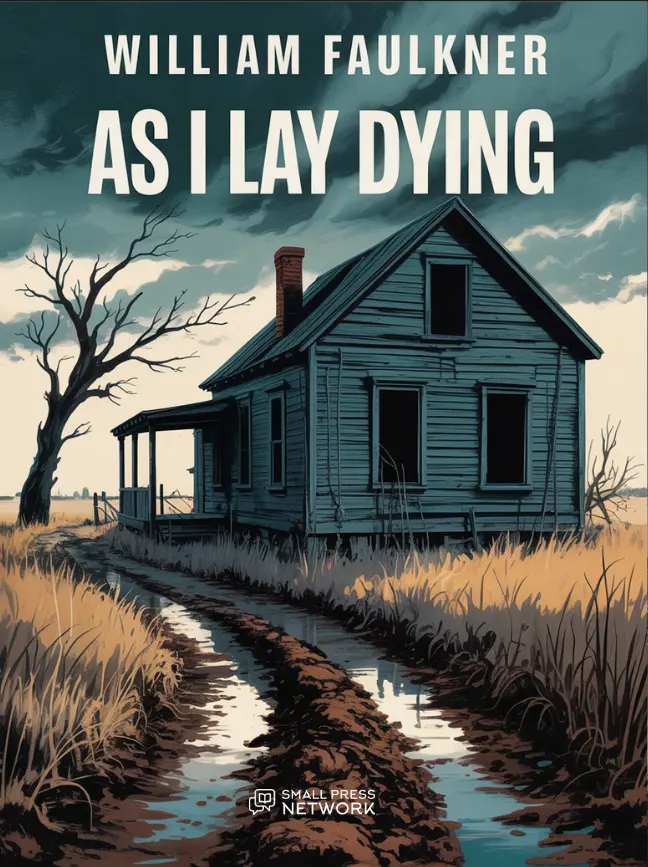Chapter 5 At seven the next morning the telephone rang.
Slowly I swam up from the bottom of a black sleep. I already had a telegram from Jay Cee stuck in my mirror, telling me not to bother to come into work but to rest for a day and get completely well, and how sorry she was about the bad crabmeat, so I couldn’t imagine who would be calling.
I reached out and hitched the receiver on to my pillow so the mouthpiece rested on my collarbone and the earpiece lay on my
shoulder.
“Hello?”
A man’s voice said, “Is that Miss Esther Greenwood?” I thought I
detected a slight foreign accent.
“It certainly is,” I said.
“This is Constantin Something-or-Other.”
I couldn’t make out the last name, but it was full of S’s and K’s. I didn’t know any Constantin, but I hadn’t the heart to say so.
Then I remembered Mrs Willard and her simultaneous interpreter.
“Of course, of course!” I cried, sitting up and clutching the phone to me with both hands.
I’d never have given Mrs Willard credit for introducing me to a man named Constantin.
I collected men with interesting names. I already knew a Socrates.
He was tall and ugly and intellectual and the son of some big Greek movie producer in Hollywood, but also a Catholic, which ruined it for both of us. In addition to Socrates I knew a White Russian named Attila at the Boston School of Business Administration.
Gradually I realized that Constantin was trying to arrange a meeting for us later in the day.
“Would you like to see the UN this afternoon?”
“I can already see the UN,” I told him, with a little hysterical giggle.
50 | Chapter 5
He seemed nonplussed.
“I can see it from my window.” I thought perhaps my English was
a touch too fast for him.
There was a silence.
Then he said, “Maybe you would like a bite to eat afterwards.”
I detected the vocabulary of Mrs Willard and my heart sank. Mrs Willard always invited you for a bite to eat. I remembered that this man had been a guest at Mrs Willard’s house when he first came to America—Mrs Willard had one of these arrangements where you open your house to foreigners and then when you go abroad they open their houses to you.
I now saw quite clearly that Mrs Willard had simply traded her open house in Russia for my bite to eat in New York.
“Yes, I would like a bite to eat,” I said stiffly. “What time will you come?”
“I’ll call for you in my car about two. It’s the Amazon, isn’t it?”
“Yes.”
“Ah, I know where that is.”
For a moment I thought his tone was laden with special meaning, and then I figured that probably some of the girls at the Amazon were secretaries at the UN and maybe he had taken one of them out at one time. I let him hang up first, and then I hung up and lay back in the pillows, feeling grim.
There I went again, building up a glamorous picture of a man who would love me passionately the minute he met me, and all out of a few prosy nothings. A duty tour of the UN and a post-UN sandwich!
I tried to jack up my morale.
Probably Mrs Willard’s simultaneous interpreter would be short and ugly and I would come to look down on him in the end the way I looked down on Buddy Willard. This thought gave me a certain satisfaction. Because I did look down on Buddy Willard, and although everybody still thought I would marry him when he came out of the TB place, I knew I would never marry him if he were the
last man on earth.
Buddy Willard was a hypocrite.
Chapter 5 | 51
Of course, I didn’t know he was a hypocrite at first. I thought he was the most wonderful boy I’d ever seen. I’d adored him from a distance for five years before he even looked at me, and then there was a beautiful time when I still adored him and he started looking at me, and then just as he was looking at me more and more I discovered quite by accident what an awful hypocrite he was, and now he wanted me to marry him and I hated his guts.
The worst part of it was I couldn’t come straight out and tell him what I thought of him, because he caught TB before I could do that, and now I had to humour him along till he got well again and could take the unvarnished truth.
I decided not to go down to the cafeteria for breakfast. It would only mean getting dressed, and what was the point of getting dressed if you were staying in bed for the morning? I could have called down and asked for a breakfast tray in my room, I guess, but then I would have to tip the person who brought it up and I never knew how much to tip. I’d had some very unsettling experiences trying to tip people in New York.
When I first arrived at the Amazon a dwarfish, bald man in a bellhop’s uniform carried my suitcase up in the elevator and unlocked my room for me. Of course I rushed immediately to the window and looked out to see what the view was. After a while I was aware of this bellhop turning on the hot and cold taps in my washbowl and saying “This is the hot and this is the cold” and switching on the radio and telling me the names of all the New York stations and I began to get uneasy, so I kept my back to him and said firmly, “Thank you for bringing up my suitcase.”
“Thank you thank you thank you. Ha!” he said in a very nasty insinuating tone, and before I could wheel round to see what had come over him he was gone, shutting the door behind him with a rude slam.
Later, when I told Doreen about his curious behaviour, she said, “You ninny, he wanted his tip.”
I asked how much I should have given and she said a quarter at least and thirty-five cents if the suitcase was too heavy. Now I could
52 | The Bell Jar
have carried that suitcase to my room perfectly well by myself, only the bellhop seemed so eager to do it that I let him. I thought that sort of service came along with what you paid for your hotel room.
I hate handing over money to people for doing what I could just as easily do myself, it makes me nervous.
Doreen said ten per cent was what you should tip a person, but I somehow never had the right change and I’d have felt awfully silly giving somebody half a dollar and saying, “Fifteen cents of this is a tip for you, please give me thirty-five cents back.”
The first time I took a taxi in New York I tipped the driver ten cents. The fare was a dollar, so I thought ten cents was exactly right and gave the driver my dime with a little flourish and a smile. But he only held it in the palm of his hand and stared and stared at it, and when I stepped out of the cab, hoping I had not handed him a Canadian dime by mistake, he started yelling, “Lady I gotta live like you and everybody else,” in a loud voice which scared me so much I broke into a run. Luckily he was stopped at a traffic light or I think he would have driven along beside me yelling in that embarrassing way.
When I asked Doreen about this she said the tipping percentage might well have risen from ten to fifteen per cent since she was last in New York. Either that, or that particular cab-driver was an out and out louse.
I reached for the book the people from Ladies’ Day had sent.
When I opened it a card fell out. The front of the card showed a poodle in a flowered bedjacket sitting in a poodle basket with a sad face, and the inside of the card showed the poodle lying down in the basket with a little smile, sound asleep under an embroidered sampler that said, “You’ll get well best with lots and lots of rest”. At the bottom of the card somebody had written, “Get well quick! from all of your good friends at Ladies’ Day” in lavender ink.
I flipped through one story after another until finally I came to a story about a fig-tree.
This fig-tree grew on a green lawn between the house of a Jewish man and a convent, and the Jewish man and a beautiful dark nun
Chapter 5 | 53
kept meeting at the tree to pick the ripe figs, until one day they saw an egg hatching in a bird’s nest on a branch of the tree, and as they watched the little bird peck its way out of the egg, they touched the backs of their hands together, and then the nun didn’t come out to pick figs with the Jewish man any more but a mean-faced Catholic kitchen-maid came to pick them instead and counted up the figs the man picked after they were both through to be sure he hadn’t picked any more than she had, and the man was furious.
I thought it was a lovely story, especially the part about the fig- tree in winter under the snow and then the fig-tree in spring with all the green fruit. I felt sorry when I came to the last page. I wanted to crawl in between those black lines of print the way you crawl through a fence, and go to sleep under that beautiful big green fig- tree.
It seemed to me Buddy Willard and I were like that Jewish man and that nun, although of course we weren’t Jewish or Catholic but Unitarian. We had met together under our own imaginary fig-tree, and what we had seen wasn’t a bird coming out of an egg but a baby coming out of a woman, and then something awful happened and we went our separate ways.
As I lay there in my white hotel bed feeling lonely and weak, I thought of Buddy Willard lying even lonelier and weaker than I was up in that sanatorium in the Adirondacks, and I felt like a heel of the worst sort. In his letters Buddy kept telling me how he was reading poems by a poet who was also a doctor and how he’d found out about some famous dead Russian short story writer who had been a doctor too, so maybe doctors and writers could get along fine after all.
Now this was a very different tune from what Buddy Willard had been singing all the two years we were getting to know each other.
I remember the day he smiled at me and said, “Do you know what a
poem is, Esther?”
“No, what?” I said.
“A piece of dust.” And he looked so proud of having thought of this
54 | The Bell Jar
that I just stared at his blond hair and his blue eyes and his white teeth—he had very long, strong white teeth—and said “I guess so.”
It was only in the middle of New York a whole year later that I finally thought of an answer to that remark.
I spent a lot of time having imaginary conversations with Buddy Willard. He was a couple of years older than I was and very scientific, so he could always prove things. When I was with him I had to work to keep my head above water.
These conversations I had in my mind usually repeated the beginnings of conversations I’d really had with Buddy, only they finished with me answering him back quite sharply, instead of just sitting around and saying “I guess so”.
Now, lying on my back in bed, I imagined Buddy saying, “Do you
know what a poem is, Esther?”
“No, what?” I would say.
“A piece of dust.”
Then just as he was smiling and starting to look proud, I would say, “So are the cadavers you cut up. So are the people you think you’re curing. They’re dust as dust as dust. I reckon a good poem lasts a whole lot longer than a hundred of those people put together.”
And of course Buddy wouldn’t have any answer to that, because what I said was true. People were made of nothing so much as dust, and I couldn’t see that doctoring all that dust was a bit better than writing poems people would remember and repeat to themselves when they were unhappy or sick and couldn’t sleep.
My trouble was I took everything Buddy Willard told me as the honest-to-God truth. I remember the first night he kissed me. It was after the Yale Junior Prom.
It was strange, the way Buddy had invited me to that Prom.
He popped into my house out of the blue one Christmas vacation, wearing a thick white turtleneck sweater and looking so handsome I could hardly stop staring and said, “I might drop over to see you at college some day, all right?”
I was flabbergasted. I only saw Buddy at church on Sundays when we were both home from college, and then at a distance, and I
Chapter 5 | 55
couldn’t figure what had put it into his head to run over and see me—he had run the two miles between our houses for cross- country practice, he said.
Of course, our mothers were good friends. They had gone to school together and then both married their professors and settled down in the same town, but Buddy was always off on a scholarship at prep school in the fall or earning money by fighting blister rust in Montana in the summer, so our mothers being old school chums really didn’t matter a bit.
After this sudden visit I didn’t hear a word from Buddy until one fine Saturday morning in early March. I was up in my room at college, studying about Peter the Hermit and Walter the Penniless for my history exam on the crusades the coming Monday when the hall phone rang.
Usually people are supposed to take turns answering the hall phone, but as I was the only freshman on a floor with all seniors they made me answer it most of the time. I waited a minute to see if anybody would beat me to it. Then I figured everybody was probably out playing squash or away on week-ends, so I answered it myself.
“Is that you, Esther?” the girl on watch downstairs said, and when I said “Yes,” she said, “There’s a man to see you.”
I was surprised to hear this, because of all the blind dates I’d had that year not one called me up again for a second date. I just didn’t have any luck. I hated coming downstairs sweaty-handed and curious every Saturday night and having some senior introduce me to her aunt’s best friend’s son and finding some pale, mushroomy fellow with protruding ears or buck teeth or a bad leg. I didn’t think I deserved it. After all, I wasn’t crippled in any way, I just studied too hard, I didn’t know when to stop.
Well, I combed my hair and put on some more lipstick and took my history book—so I could say I was on my way to the library if it turned out to be somebody awful—and went down, and there was Buddy Willard leaning against the mail table in a khaki zipper jacket and blue dungarees and frayed grey sneakers and grinning up at me.
“I just came over to say hello,” he said.
56 | The Bell Jar
I thought it odd he should come all the way up from Yale even hitch-hiking, as he did, to save money, just to say hello.
“Hello,” I said. “Let’s go out and sit on the porch.”
I wanted to go out on the porch because the girl on watch was a nosey senior and eyeing me curiously. She obviously thought Buddy had made a big mistake.
We sat side by side in two wicker rocking-chairs. The sunlight was clean and windless and almost hot.
“I can’t stay more than a few minutes,” Buddy said.
“Oh, come on, stay for lunch,” I said.
“Oh, I can’t do that. I’m up here for the Sophomore Prom with
Joan.”
I felt like a prize idiot.
“How is Joan?” I asked coldly.
Joan Gilling came from our home town and went to our church and was a year ahead of me at college. She was a big wheel—president of her class and a physics major and the college hockey champion. She always made me feel squirmy with her starey pebble-coloured eyes and her gleaming tombstone teeth and her breathy voice. She was big as a horse, too. I began to think Buddy had pretty poor taste.
“Oh Joan,” he said. “She asked me up to this dance two months ahead of time and her mother asked my mother if I would take her, so what could I do?”
“Well, why did you say you’d take her if you didn’t want to?” I asked meanly.
“Oh, I like Joan. She never cares whether you spend any money on her or not and she enjoys doing things out-of-doors. The last time she came down to Yale for house week-end we went on a bicycle trip to East Rock and she’s the only girl I haven’t had to push up hills.
Joan’s all right.”
I went cold with envy. I had never been to Yale, and Yale was the place all the seniors in my house liked to go best on week- ends. I decided to expect nothing from Buddy Willard. If you expect nothing from somebody you are never disappointed.
Chapter 5 | 57
“You better go and find Joan then,” I said in a matter-of-fact voice.
“I’ve a date coming any minute and he won’t like seeing me sitting around with you.”
“A date?” Buddy looked surprised. “Who is it?”
“It’s two,” I said, “Peter the Hermit and Walter the Penniless.”
Buddy didn’t say anything, so I said, “Those are their nicknames.”
Then I added, “They’re from Dartmouth.”
I guess Buddy never read much history, because his mouth stiffened. He swung up from the wicker rocking-chair and gave it a sharp little unnecessary push. Then he dropped a pale blue envelope with a Yale crest into my lap.
“Here’s a letter I meant to leave for you if you weren’t in. There’s a question in it you can answer by mail. I don’t feel like asking you about it right now.”
After Buddy had gone I opened the letter. It was a letter inviting me to the Yale Junior Prom.
I was so surprised I let out a couple of yips and ran into the house shouting, “I’m going I’m going I’m going.” After the bright white sun on the porch it looked pitch-dark in there, and I couldn’t make out a thing. I found myself hugging the senior on watch. When she heard I was going to the Yale Junior Prom she treated me with amazement and respect.
Oddly enough, things changed in the house after that. The seniors on my floor started speaking to me and every now and then one of them would answer the phone quite spontaneously and nobody made any more nasty loud remarks outside my door about people wasting their golden college days with their noses stuck in a book.
Well all during the Junior Prom Buddy treated me like a friend or a cousin.
We danced about a mile apart the whole time, until during “Auld Lang Syne” he suddenly rested his chin on the top of my head as if he were very tired. Then in the cold, black, three o’clock wind we walked very slowly the five miles back to the house where I was sleeping in the living-room on a couch that was too short because
58 | The Bell Jar
it only cost fifty cents a night instead of two dollars like most of the other places with proper beds.
I felt dull and flat and full of shattered visions.
I had imagined Buddy would fall in love with me that week-end and that I wouldn’t have to worry about what I was doing on any more Saturday nights the rest of the year. Just as we approached the house where I was staying Buddy said, “Let’s go up to the chemistry
lab.”
I was aghast. “The chemistry lab?”
“Yes.” Buddy reached for my hand. “There’s a beautiful view up there behind the chemistry lab.”
And sure enough, there was a sort of hilly place behind the chemistry lab from which you could see the lights of a couple of the houses in New Haven.
I stood pretending to admire them while Buddy got a good footing on the rough soil. While he kissed me I kept my eyes open and tried to memorize the spacing of the house lights so I would never forget them.
Finally Buddy stepped back. “Wow!” he said.
“Wow what?” I said, surprised. It had been a dry, uninspiring little kiss, and I remember thinking it was too bad both our mouths were so chapped from walking five miles in that cold wind.
“Wow, it makes me feel terrific to kiss you.”
I modestly didn’t say anything.
“I guess you go out with a lot of boys,” Buddy said then.
“Well, I guess I do.” I thought I must have gone out with a different
boy for every week in the year.
“Well, I have to study a lot.”
“So do I,” I put in hastily. “I have to keep my scholarship after all.”
“Still, I think I could manage to see you every third week-end.”
“That’s nice.” I was almost fainting and dying to get back to college and tell everybody.
Buddy kissed me again in front of the house steps, and the next fall, when his scholarship to Medical School came through, I went
Chapter 5 | 59
there to see him instead of to Yale and it was there I found out how he had fooled me all those years and what a hypocrite he was.
I found out on the day we saw the baby born.
60 | The Bell Jar




